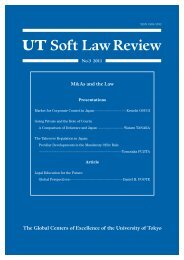UT Soft Law Review
UT Soft Law Review
UT Soft Law Review
You also want an ePaper? Increase the reach of your titles
YUMPU automatically turns print PDFs into web optimized ePapers that Google loves.
<strong>UT</strong> <strong>Soft</strong> <strong>Law</strong> <strong>Review</strong> No.2 2010of the Delaware decisional law, which is that it is a valid defense for a target company boardto create and keep in effect a rights plan whose very purpose is to dilute the shares of anyonewho “breaks through” it. If that premise is correct, then there is no legal wrongdoing by theboard, because any dilution that occurs results solely from an avoidable decision by thebidder. That is, if the bidder breaks through the pill and suffers dilution, whatever harmresults is harm that the bidder has brought upon itself.I would be interested to hear what Professor Milhaupt says on this issue. He may have adifferent view about it. But I think in the United States that concept just would not have muchtraction, so that if we had a case like Bull-Dog Sauce, there would be no compensationpayable to the bidder.Fujita: Thank you. The answer was expected in a way, but it is worth to mention as oneaspect that a scenario that is intensively discussed in Japan, where it is said to utilize theAmerican rules on defense measures, is something that a Delaware Supreme Court judge hasnot heard or thought of.IV The possibility of an alternative legal system on acquisitionsFujita: Finally, since the theme of the discussion says projection, let’s briefly look at thefuture direction. For the future, we could project that the “prior warning type” defense planwill remain as a takeover defense measure in Japan – even though some judicial precedentshave already shown the limit of its implementation – and it may gradually grow with morejudicial precedent in the future. On the other hand, as an alternative scenario, the decision todrastically change the system itself might be purposely and intentionally made at some point.In fact some people claims that British system is one of the options. While requiring thetender offer to all the shares to obtain control, the implementation of defense measuresagainst such a reasonable takeover attempt that compiles the rule is prohibited. And this ruleis governed by a special organization called takeover panel. Such system could be introducedin Japan too. If we introduce a system like this,that will significantly change the traditionalso-called American system in a wider sense. Well, considering the panel discussion we had, Iam reluctant to use the word “American Style,” though. How should we think about suchoptions? Or, should we continue the current framework? Professor Milhaupt, what do youthink? If possible, Professor Kanda, can you comment on it as well?Milhaupt: First, just to clarify, I certainly was not advocating that Japan adopt the UKsystem. That is certainly not my role; it is a question for Japanese policymakers to decide. Ithink there are some elements of the UK model that are worth considering from the Japanesestandpoint. In particular, I think the ongoing and direct interaction of the Takeover Panelwith market participants is interesting and potentially worthy of study by the Japanese.So far, developments in Japan’s takeover market to some degree resemble the process ofchange in the United States, particularly in the late 1980s; that is, the way the legal system68





